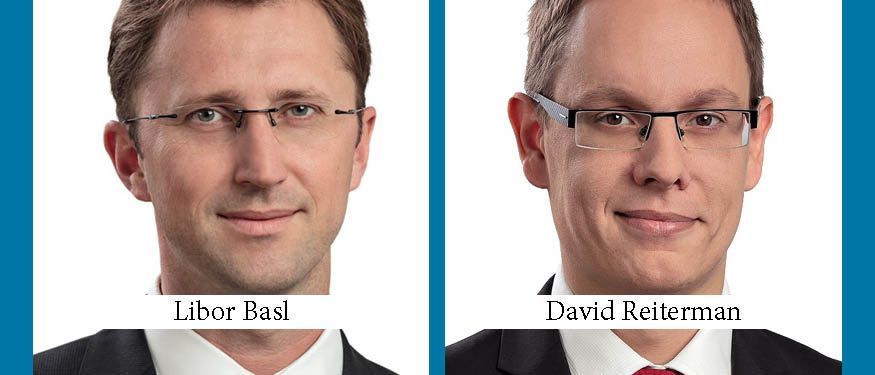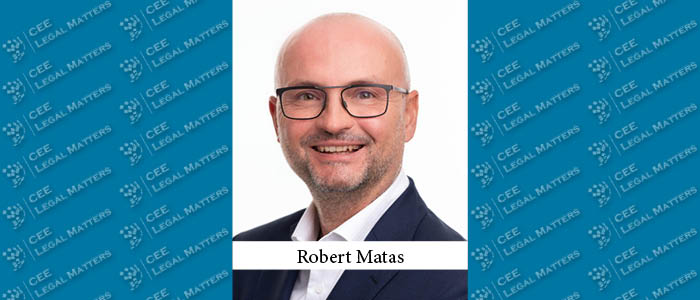The Deal:
In October 2016, CEE Legal Matters reported that Baker & McKenzie had advised European payment and transactional services provider Worldline on its agreement with Komercni Banka, a subsidiary of the Societe Generale Group, to develop products and services for Czech and Slovakian merchants. CMS advised Komercni Banka on the deal. We reached out to Baker & McKenzie Partner Libor Basl and Associate David Reiterman, both in the firm’s Prague office, for more information.
CEELM: How did you and Baker & McKenzie become involved with Worldline on this matter?
L.B.: Worldline is a subsidiary of Atos which is a global leader in digital services. Atos is one of our valued clients, and we have assisted them on a number of acquisitions over the last few years. Within the Atos group, Worldline is responsible for delivery of technologically advanced payment services. So when Worldline was searching for legal representation in the Czech Republic for this transaction they selected us, in no small part due to our experience with payment services regulation.
CEELM: What, exactly, was your mandate when you were retained for this particular project?
D.R.: Initially, we were asked to assist Worldline with initial negotiations with Komercni Banka regarding purchase of their merchant acquiring business. When you think about all the places where you can pay by your payment card, this is exactly the business we are talking about. All these businesses (stores, gas stations, restaurants, etc.) that accept or acquire payment by means of payment card (i.e., not by cash) are called merchants. And this part of the banking business is called merchant acquiring.
L.B.: Due to the introduction of EU rules regarding interchange fees for acquirers, it has become more efficient for the acquiring business to be taken over and further developed by specialized payment services providers while banks may concentrate on their core business. And this is exactly what some of the Czech banks did – they looked for a potential partner or even a purchaser of their acquiring business. And, logically, KB made the same decision.
D.R.: We initially focused on what could be the possible transaction structure and helped negotiate the basic terms of that structure. Then, as the transaction evolved, our mandate evolved as well. We had to look into various issues ranging from HR to existing contracts, IP rights, competition clearance, and financial regulatory approvals, as well as a range of corporate issues.
L.B.: In order to implement this very specific and one-off transaction we drafted a whole package of very specific industry-related and tailored-made agreements from scratch.
CEELM: Who were the members of your team, and what were their individual responsibilities?
L.B.: David and I were responsible for the day-to-day management of this transaction with help of a number of our colleagues from Prague as well as other Baker offices who are experts in IP and competition.
D.R.: Libor oversaw the transaction and was involved in negotiating its terms and structure, while I was primarily involved in drafting the relevant agreements and also assisted with financial regulatory and corporate issues that arose in the implementation phase of the deal. As we were indeed drafting very tailored documents we spent good deal of time brainstorming between ourselves and with our colleagues what the best way to go was.
CEELM: How is the agreement structured, and what was your role in helping it get there?
D.R.: The final deal was to establish a merchant acquiring alliance between Worldline and KB. This sentence may sound simple, but you have a Czech bank, a Belgian provider of payment services including merchant acquiring services, and no precedent to rely on. So we have a fairly complex cross-border transaction in which we need to legally underpin the conditions of the future cooperation of two parties with different regulatory backgrounds in a very technical field of merchant acquiring.
L.B.: This is a transaction ruled by a series of agreements, from rather straightforward acquisition documents up to a much more complicated alliance agreement and documentation governing migration of the business, in an environment where even a few hours of service disruption is a serious problem. This all in a situation where you need to discuss with two regulators and address all their requirements. Our role was to make sure that all the legal challenges were addressed and that this business cooperation has a solid and working legal basis in the relevant documents.
CEELM: What was the most challenging or frustrating part of the process?
L.B.: Many parts of this deal were challenging, as we needed to move the transaction forward. We had to invent solutions that worked both legally and also in real life. As you can imagine, especially given the different and sometimes completely opposite business drivers of your counterparty, this may not be that easy to combine.
D.R.: When I think about this, one specific memory comes to my mind. From a regulatory perspective, one of the more challenging parts concerned the structuring of the alliance in accordance with Czech laws implementing the EU Payment Services Directive, while keeping in mind the position of the Belgium National Bank as Worldline’s regulator, since the first EU Payment Services Directive (which is still in place) is implemented differently in Belgium and in the Czech Republic. All parties had some serious discussions on what is and what is not doable. In the end, we were happy to see that both regulators demonstrated a very rational business approach and helped us reach a satisfactory compromise and push the deal through.
L.B.: Also, the acquiring business is rather specific. In order to be able to grasp the whole thing on paper, you need to have at least some basic understanding of how it works technically and what the flows of money are. This is a fairly complex technical payment mechanism, involving several parties (the merchant’s bank, the issuers bank, the acquirer, the payment processor, payment schemes, the merchant, the customer, etc.).
D.R.: Sometimes, when I was reading through the technical manuals to better understand what’s going on, I saw myself as a student of technical engineering rather than a lawyer. But anyway, I think it was a fresh breeze into our usual transactional work, which typically revolves around drafting legal documentation or analyzing legislation or case law. Frankly, I enjoyed it, and I believe that such exercise makes one a better lawyer, as you have a chance to learn how to put a technical or business issue into a workable legal concept and you also get an invaluable industry insight.
CEELM: Was there any part of the process that was unusually or unexpectedly easy?
L.B.: As all parties practically pioneered the whole transaction structure, I wouldn’t say that any part was unusually or unexpectedly smooth or easy. We had no precedent to rely on, but it was really motivational to go with the client step by step through the process and learn on the go.
CEELM: Did the final result match your initial mandate, or did it change somehow from what was initially anticipated?
L.B.: I believe the final result matches the initial mandate, despite the fact that we had to tweak some details of the transaction structure as it progressed over time.
D.R.: Apart from this, we are happy to see that the client has also instructed us on a whole range of other issues that are connected with the initial mandate, and that we have become its point of contact in terms of the establishment and operation of its acquiring business here in the Czech Republic.
L.B.: Well, our work on this deal is not yet fully done. Although we have all the legal agreements in place, there is still much to do from operational and technical points of view. I expect to be facing some interesting challenges in the next few weeks and months during the technical implementation of the project.
D.R: The business guys will certainly come up with great ideas how to move forward. I think it’s really interesting to analyze how the relevant technical solution may work within legal boundaries that were set five or even more years ago, when no one actually could even think about this kind of situation.
CEELM. What individuals at Worldline directed you, and how would you describe your working relationship with them?
L.B.: We’ve had the chance to be involved with a lot of colleagues from Worldline. Given our attorney confidentiality, we would prefer not saying any names here. However, we can definitely say that it’s been a real pleasure working with them. And we hope the client enjoyed our cooperation, too.
D.R.: Yeah, I still remember our closing, which was completed faster than expected, and we found ourselves together with our client with a celebration glass at 11:00 in the morning. I don’t think that the rest of the day was so productive, but I think it was definitely worth it (laughs).
CEELM. How would you describe the working relationship with your counterparts at CMS on the deal?
L.B.: In short, professional and productive. Both parties were driven in the same direction in their efforts to lay grounds for a long-term acquiring alliance, we were happy to see that legal negotiations with our colleagues from CMS were more flexible than what you normally see in a straightforward acquisition.
D.R.: Just like us, our colleagues from CMS were commercially driven, and I believe that no party felt any need to start a major legal battle. Of course, we had some situations of disagreement, but we were all able to come up with workable compromises fairly quickly.
CEELM: How would you describe the significance of the deal?
L.B.: This deal was really complex and, to a large extent, unique. We believe that for both Worldline and KB it was also really significant – on one hand, KB was looking for a business partner in order to keep its acquiring business as efficient as possible, while Worldline, on the other hand, took this as a great opportunity to strengthen its presence in CEE.
D.R.: Worldline is now actually very active; on the day it announced the acquisition of the KB acquiring business, Worldline also announced the successful completion of the merger of Equens and Paysquare within the Worldline group, by way of which Worldline has become a Pan-European champion in payment services. We are very happy that we could contribute to Worldline’s success, and we very much look forward to future cooperation with them.
This Article was originally published in Issue 3.6 of the CEE Legal Matters Magazine. If you would like to receive a hard copy of the magazine, you can subscribe here.





























